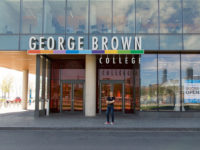Having examined how Brock University and George Brown College (part one and part two) came to support the Bell coalition website blocking plan, this post relies on Ryerson documents obtained under access to information laws to reveal how Charles Falzon, Ryerson’s Dean of Communications and Design, came to write in support of the site blocking plan. Much like the other two institutions, Falzon was approached by Mark Milliere, a Bell executive, asking for Ryerson’s support for the initiative.
Post Tagged with: "ryerson"
How Did George Brown College Come to Support the FairPlay Site Blocking Plan? Docs Show Bell Lobbied the School’s President
How did George Brown College President Anne Sado come to write a letter in support of the Bell coalition website blocking plan? Given the prior reports on Bell’s internal astroturfing campaign and the pressure on a Brock University executive (subsequently distanced by the University) it will come as little surprise to learn that the origins stem from direct Bell lobbying. According to documents obtained under provincial access to information laws, Mark Milliere, TSN’s Senior Vice President and General Manager (part of Bell Media) relied on the same playbook as with Brock University, citing its support for the college and urging it to write in support to the CRTC. The request included sample letters from Brock and Ryerson University (more on Ryerson in a forthcoming post).
More Schools Backing Away from Access Copyright
As the fight over the proposed Access Copyright interim tariff heats up (Howard Knopf offers links to must-read submissions from many objectors), more Canadian schools are gearing up for life without the copyright collective. Medicine Hat College posted a notice about leaving on Friday, while Ryerson has advised faculty that […]
Ryerson Reverses on Facebook Expulsion
Outcome of the hearing here.
Ryerson Student Faces Expulsion for Facebook Use
The big story in Toronto today is news that a student may face expulsion from Ryerson University for their use of Facebook. In this instance, the student was an administrator of a Facebook group that students in a chemistry class used to assist one another with assignments. It would appear […]








